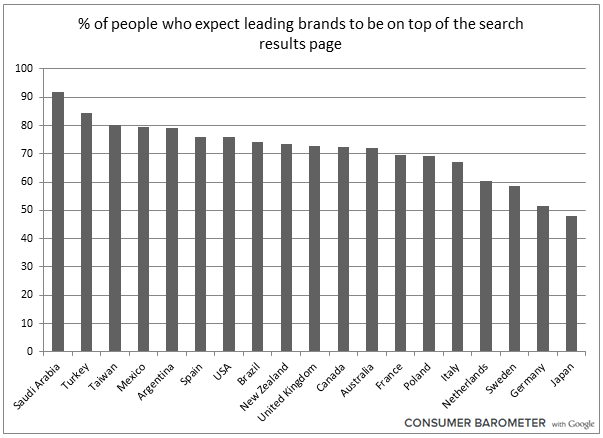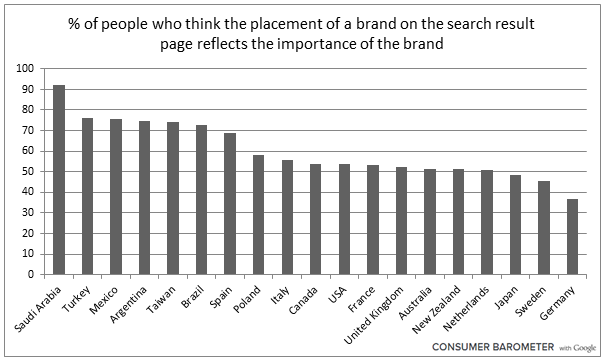Over and over research shows that the top 3 listings on search engine result pages receive significantly more clicks than listings down the ladder. Shocker, I know. But while top rankings on search engines are absolutely vital for online brand visibility, traffic and ultimately business, SERP prominence serves another purpose that is talked about and assessed less frequently.
What I’m here referring to is the impact high rankings have on brand perception. In other words, are consumers more inclined to correlate a high ranking with a strong, authoritative and trustworthy brand? Experienced SEOs will tell you yes. The intuitive answer would also be yes. But is this really so? And if yes, does it differ across countries?
According to the Consumer Barometer by IAB/TNT/Google – an insanely cool (and free) insights tool that allows you to analyse and compare the digital landscape in 39 countries worldwide – the answer to both is yes.
Leading brands are expected to be on top of the search results page
Leading companies that fail to convert their brand equity into prominent rankings will not only lose out on a large amount of traffic but also fail to meet the expectations of online consumers. In fact, Japan is the only country in the chart below where less than half of the online population expect leading brands to dominate the search engine shelf space. Conversely, more than 9 in 10 of Saudi Arabia’s online consumers expect high SERP visibility from leading brands. Consumers similarly have well above average expectations to leading brands in Turkey, Taiwan, Mexico and Argentina, whereas the online population in highly developed internet economies like Sweden, Netherlands and Germany to a lesser extent expect overall brand strength to be reflected in high visibility on the likes of Google, Yandex and Baidu.
High rankings could very well be your cheapest and fastest way to gain local consumer trust
This site talks a lot about the opportunities and challenges connected to international expansion. On the challenges side of things, one issue that pops up time and again relates to brand strength. Specifically, how do you go about doing business in a country where you (at least initially) don’t enjoy the same brand strength as in your domestic market?
Surely, it can be an expensive and uphill battle to create a strong reputation in a market where you have little to no brand awareness. Should the objective of increasing awareness come at the expense of severely reduced profit margins due to lower-priced penetration strategies? Or through a significant ramp up of your advertising efforts? Or other profit squeezing market entry strategies?
Turns out there’s another option.
According to findings from the Consumer Barometer, a majority of online consumers equate search engine placement of a brand with its importance. Put simply, the more prominent your brand is in search engine results, the more important it will be perceived.
That said, as can be seen below, there are vast existing differences between countries, with emerging markets placing greater emphasis on the correlation between high rankings and ‘brand importance’.
Largely similar to the graph above, in Germany a modest 1 in 3 online consumers say that SERP placement of a brand reflects on its importance, whereas this figure is 2-2.5 times higher in Spain, Brazil, Taiwan, Argentina, Mexico, Turkey and Saudi Arabia.
Now, should this reflect on how you allocate your budgets in the locale? Of course it should.
In some countries high rankings alone won’t turn your unknown brand into a trusted provider of goods or services. In others this may suffice. High rankings are for obvious reasons – the ones of visibility and traffic that we already touched upon in the article – very important for any internet business in any country. But in some markets there’s an added value in the shape of improved brand strength so notable that achieving that top rank will make the sweet spot even sweeter. The efforts your company puts into SEO when entering foreign markets should reflect this.










One Response
This is very good article about Global perspective. For saudi arabia it is the good thing such people who expect leading brands to be on top of the search results page.